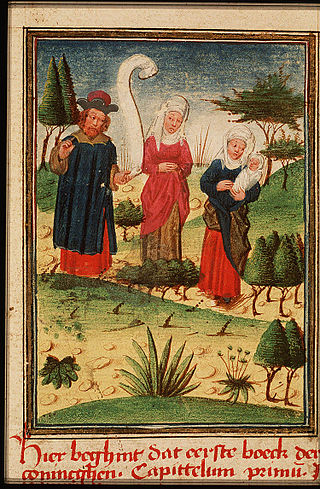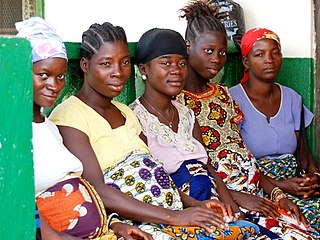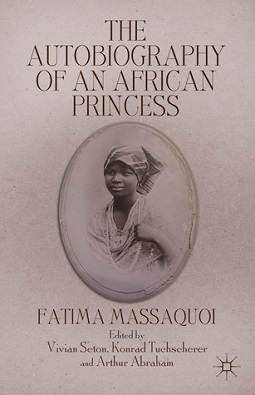Related Research Articles

Polygyny is the most common and accepted form of polygamy around the world, entailing the marriage of a man with several women.

In cultures where monogamy is mandated, bigamy is the act of entering into a marriage with one person while still legally married to another. A legal or de facto separation of the couple does not alter their marital status as married persons. In the case of a person in the process of divorcing their spouse, that person is taken to be legally married until such time as the divorce becomes final or absolute under the law of the relevant jurisdiction. Bigamy laws do not apply to couples in a de facto or cohabitation relationship, or that enter such relationships when one is legally married. If the prior marriage is for any reason void, the couple is not married, and hence each party is free to marry another without falling foul of the bigamy laws.
The Krahn are an ethnic group of Liberia and Ivory Coast. This group belongs to the Kru language family and its people are sometimes referred to as the Wee, Guéré, Sapo, or Wobe. It is likely that Western contact with the Kru language is the primary reason for the development of these different names.

The culture of Liberia reflects this nation's diverse ethnicities and long history. Liberia is located in West Africa on the Atlantic Coast.

The Poro, or Purrah or Purroh, is a men's secret society in Sierra Leone, Liberia, Guinea, and the Ivory Coast, introduced by the Mane people. It is sometimes referred to as a hunting society and only males are admitted to its ranks. The female counterpart of the Poro society is the Sande society.
Conflict of marriage laws is the conflict of laws with respect to marriage in different jurisdictions. When marriage-related issues arise between couples with diverse backgrounds, questions as to which legal systems and norms should be applied to the relationship naturally follow with various potentially applicable systems frequently conflicting with one another.
Momolu Duwalu Bukele was the inventor of the Vai syllabary used for writing the Vai language of Liberia—one of several African languages to develop its own writing system.

The Loma people, sometimes called Loghoma, Looma, Lorma or Toma, are a West African ethnic group living primarily in mountainous, sparsely populated regions near the border between Guinea and Liberia. Their population was estimated at 330,000 in the two countries in 2010. They are closely related to the Mende people.
Christianity is the predominant religion in Liberia, with Protestantism being its largest denomination. Muslims are the largest minority group, largely coming from the Mandingo and Vai ethnic groups. The vast majority of Muslims are Malikite Sunni, with sizeable Shia and Ahmadiyya minorities.
Marriage in the Palestinian territories deals with the marriage law and customs in the Palestinian territories, i.e., the West Bank and the Gaza Strip. Israeli marriage law applies to Israeli settlers in Area C of the West Bank and to residents of East Jerusalem.
Akin to Uganda, Republic of the Congo and the Central African Republic, Zambia is one of the few Christian nations that allows polygamous unions to be legally formed. Under Zambian law, polygamous unions may be contracted and they have been reported to be extremely widespread in the nation. Similar to most countries that provide polygamy as a form of marriage, the first wife must consent to the practice of polygamy before she marries her husband. If she declines, her husband will not be allowed to marry another woman while married to his current wife. According to a 2003 survey, 16% of marriages in Zambia are polygamous. While frequently more common in rural areas, the practice can also be found in more urban settings.
Polygamy is legal in Indonesia, the largest Muslim population in the world. Polygamy in Indonesia is not just practiced by Muslims, but also customarily done by non-Muslim minorities, such as the Balinese and the Papuans.
The legal status of polygamy varies widely around the world. Polygyny is legal in 58 out of nearly 200 sovereign states, the vast majority of them being Muslim-majority countries. Some countries that permit polygamy have restrictions, such as requiring the first wife to give her consent.
Polygamy is the practice of having more than one spouse; while prohibited under Zimbabwean civil law, polygamous marriages may be performed under the country's customary law. Less than one-fifth of the country's population are engaged in polygamy.
Polygamy is illegal in Ghana, but the restrictions are not heavily enforced. Polygamous marriages are illegal under civil law, though are arguably considered to be legal under customary law. Despite these exceptions, there have been no reports of a legally contracted polygamous marriage in Ghana; and are considered to be "de facto" illegal. An estimated 22% of Ghanaian women live polygamously.
South African customary law refers to a usually uncodified legal system developed and practised by the indigenous communities of South Africa. Customary law has been defined as
an established system of immemorial rules evolved from the way of life and natural wants of the people, the general context of which was a matter of common knowledge, coupled with precedents applying to special cases, which were retained in the memories of the chief and his councilors, their sons and their sons' sons until forgotten, or until they became part of the immemorial rules.

The extent of gender inequalities varies throughout Liberia in regard to status, region, rural/urban areas, and traditional cultures. In general, women in Liberia have less access to education, health care, property, and justice when compared to men. Liberia suffered two devastating civil wars from 1989–1996 and 1999–2003. The wars left Liberia nearly destroyed with minimal infrastructure and thousands dead. Liberia has a Human Development Report ranking of 174 out of 187 and a Gender Inequality Index rank of 154 out of 159.

The Autobiography of an African Princess, published in 2013, is an account of the early years (1912–1946) in the life of Fatima Massaquoi, a descendant of the royal families of the Gallinas from Sierra Leone and Liberia. It describes her early childhood in Africa, her schooling in Germany and Switzerland and her university studies in the United States.
In Liberia, the snap handshake or finger snap is a gesture of greeting, in which two people shake hands in the conventional Western way, but end the handshake with a mutual press of the fingers that creates a "snap" sound.
Ayodeji Oladimeji Olukoju is a Nigerian University distinguished professor of history at the University of Lagos, Nigeria. He was a two-term vice chancellor of Caleb University, Imota between 2010 and 2016. Olukoju's research interests are in the area of maritime, transport, economic, social, corporate and urban history of Nigeria.
References
- ↑ Liberia: SIG Index
- ↑ OECD Atlas of Gender and Development: How Social Norms Affect Gender Equality in non-OECD Countries, OECD Publishing, 2010. p 236.
- ↑ Olukoju, Ayodeji. "Gender Roles, Marriage and Family."Culture and Customs of Liberia . Westport : Greenwood Press, 2006. p 97.
- ↑ Olukoju, Ayodeji. "Gender Roles, Marriage and Family."Culture and Customs of Liberia . Westport : Greenwood Press, 2006. p 98.